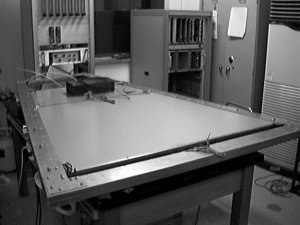 |
|
The Iowa State - Seoul Connection by Mike Perricone
“My very first Ph.D. student was Sung K. Park from Korea University in Seoul,” Hauptman said. “Park told me very early in our association that he was going to build a high-energy physics lab in Korea. No such thing existed at the time. But he actually went back and built the Korea Detector Laboratory (KODEL), where they are now building hundreds and hundreds of square meters of muon chambers. They are an enormous factory, and they are big players in the muon system at CMS [Compact Muon Solenoid detector being built for the Large Hadron Collider at CERN].”
The Hauptman-Park association has grown into an unofficial connection between the Iowa State group and students from Korea. Park also joined the DZero collaboration, and three of his students are currently involved with luminosity projects at DZero, as well as with communications software linking the detector to accelerators and to subsystems.
The Korea Detector Laboratory has a major responsibility for R&D and construction of the Resistive Plate Chambers (RPC) at the forward region of CMS to detect muons produced by proton-proton collisions. Prototype chambers for the double gap RPC, the read-out electronics, and the data acquisition system have been constructed. In addition, Monte-Carlo simulations are optimizing the performance of the chamber operation and the data transformation.
Back to "Learning and Growing"
|
 Iowa State’s John Hauptman and DZero co-spokesperson John Womersley are applying for grants from the National Science Foundation and from KOSEF, the national science foundation of Korea, to gain support for Korean students to come to Fermilab, and for young DZero physicists to travel to Korea. The proposals came about in large part because a former Korean graduate student made a promise and kept it.
Iowa State’s John Hauptman and DZero co-spokesperson John Womersley are applying for grants from the National Science Foundation and from KOSEF, the national science foundation of Korea, to gain support for Korean students to come to Fermilab, and for young DZero physicists to travel to Korea. The proposals came about in large part because a former Korean graduate student made a promise and kept it.